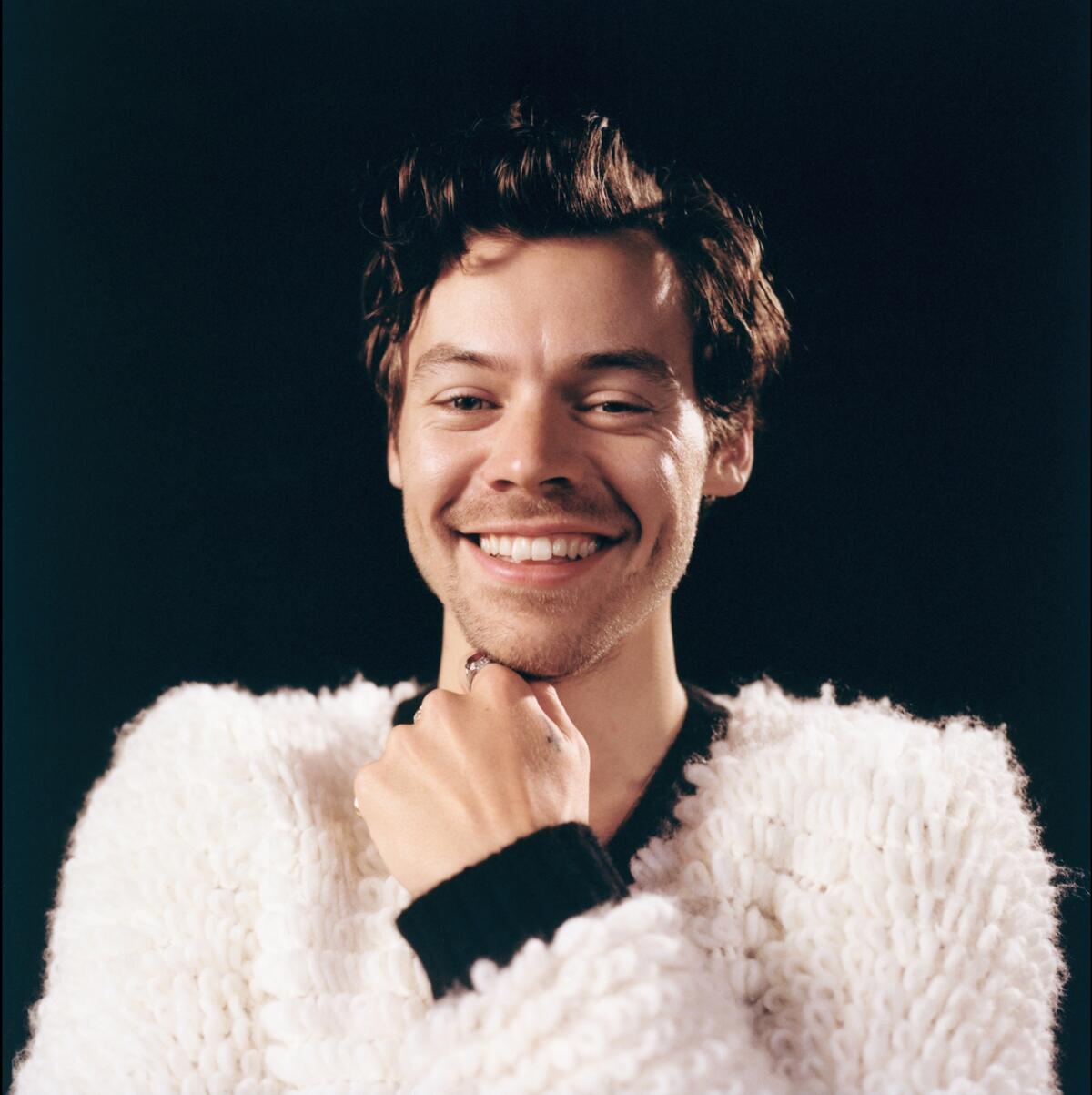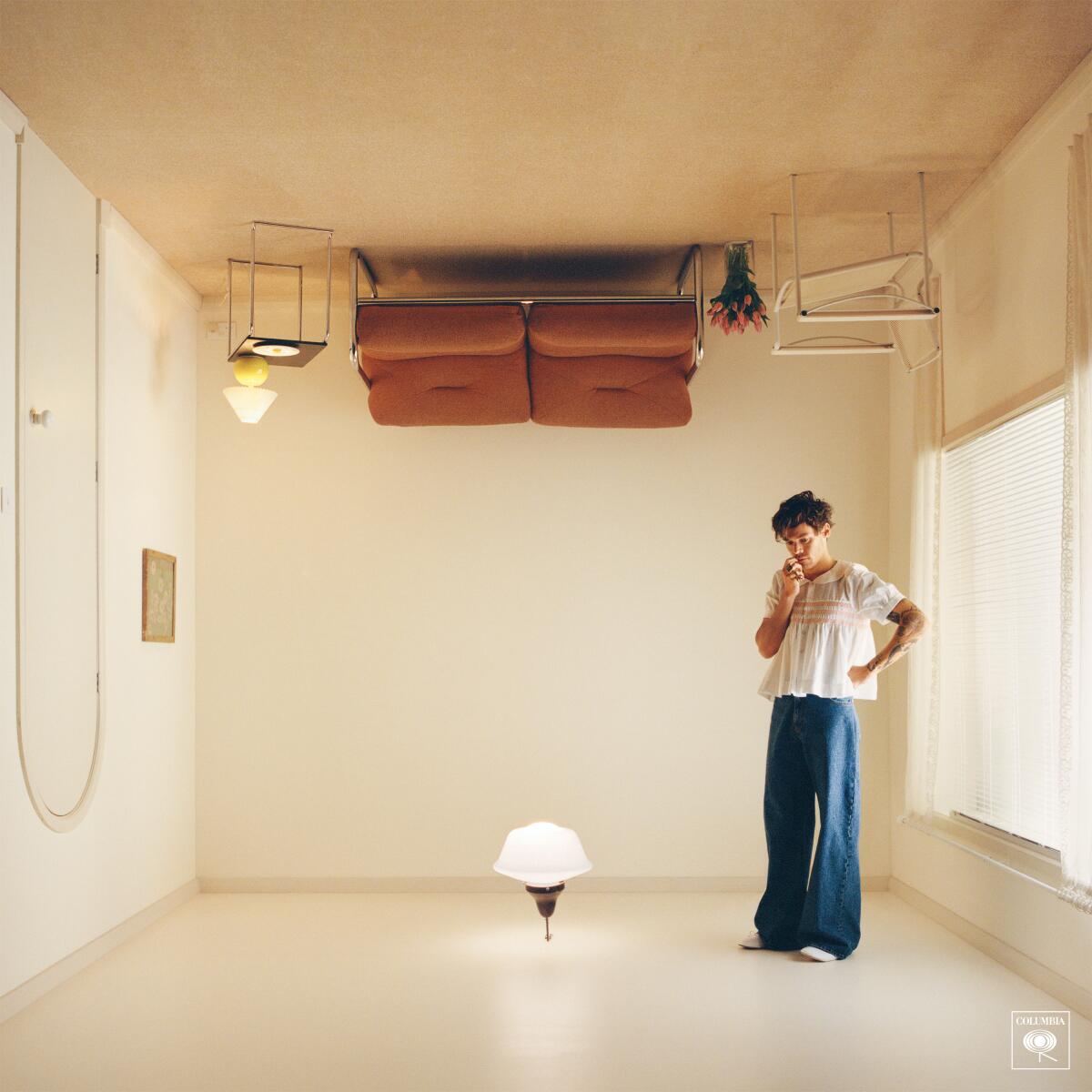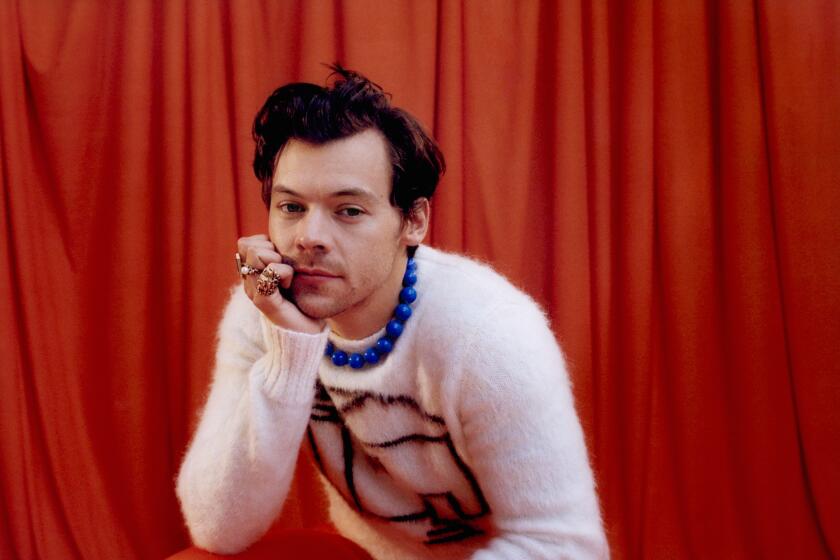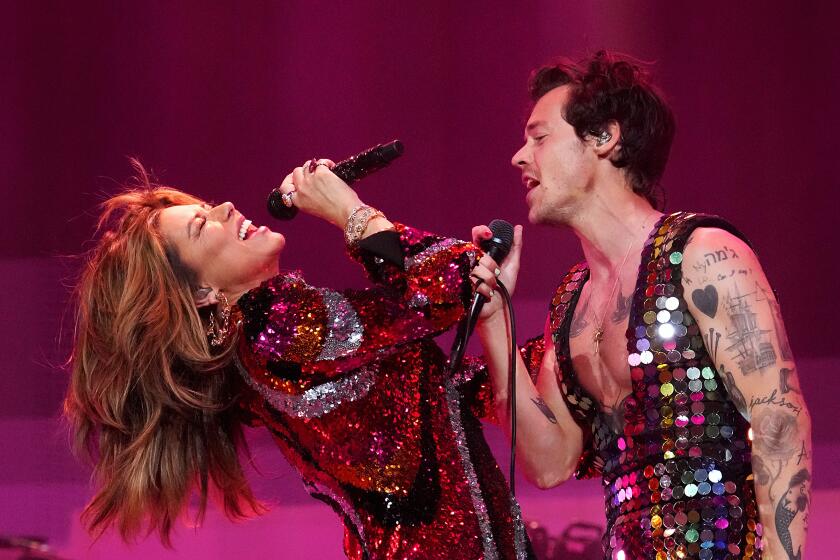Sexed up and sensitive, Harry Styles stakes his claim as the perfect boyfriend and pop star

- Share via
On “Boyfriends” — a lovely, Laurel Canyon-ish acoustic ballad from his new album, “Harry’s House” — Harry Styles runs down some of the many reasons such figures are to be avoided.
“They take you for granted,” he sings, close harmonizing with himself like a one-man Crosby, Stills & Nash. They call only when they “don’t want to be alone.” Worst of all, he points out, they start “secretly drinking,” at which point it “gets hard to know” what they’re thinking.
When Styles, who found global fame in the British boy band One Direction before striking out as a solo act, debuted “Boyfriends” at Coachella last month, the 28-year-old introduced the song by asking how many people in the festival crowd had had a boyfriend and how many hadn’t. Then he added: “To boyfriends everywhere: F— you.”
Harry Styles’ third solo album, ‘Harry’s House,’ includes references to Los Angeles, his goddaughter and ‘Don’t Worry Darling’ director Olivia Wilde.
The tune’s unspoken promise, of course, is that Styles is different — that, given the chance, he’d prove an exception to the rule that men are trash. And indeed, the rest of “Harry’s House,” due Friday, is filled with tender assurances of his emotional availability (not to mention his erotic ingenuity).
“If I was a bluebird / I would fly to you,” he croons over a jaunty synth riff in “Daylight,” “You’d be the spoon / Dip you in honey so I could be sticking to you.”
Yet the note of allyship he strikes in “Boyfriends,” in which he carefully avoids gendering the person he’s addressing, feels crucial to the whole Harry Styles enterprise; it’s what sets him apart from any number of the onetime teen idols who’ve preceded him — and part of what’s made him as much a kind of woke Gen Z thought leader as a vest-with-no-shirt heartthrob.

Styles stands for inclusion, respect and sensitivity, though none of that has come at the expense of the wriggly charm he spilled all over Coachella’s stage in a rainbow-sequined jumpsuit. Our man Harry gets it, is the thing; he’s someone to confide in and someone to drool over, a new-school dreamboat who’s defined his sexual identity vaguely enough to allow anyone interested to climb aboard.
Styles performed at Day 1 of Coachella with a personal touch, making the field of fans feel like they’re taking part in the rituals alongside him.
On his first two solo LPs, Styles’ music — a crafty pastiche of crinkly dad-rock signifiers — also distinguished him from the likes of Shawn Mendes and Justin Bieber and Timberlake. This time, a few rustic slow ones aside, he’s moved forward from the ’60s and ’70s to embrace the same ’80s sounds many of his peers have: “As It Was,” the album’s hit lead single, cribs the tick-tocking A-ha groove the Weeknd borrowed for “Blinding Lights”; “Music for a Sushi Restaurant” has a rubbery bass line and bleating Fine Young Cannibals horns.
Throughout “Harry’s House,” Styles’ longtime producers Kid Harpoon and Tyler Johnson pile on the glimmering keyboards and booming drums and scrubbing post-disco guitars; John Mayer, fresh from last year’s Cold War-cosplay “Sob Rock,” drops by to lend tasty licks to “Cinema” and “Daydreaming.” (Other guests include Pino Palladino, Ben Harper and Dev Hynes of Blood Orange, the last two of whom will serve as Styles’ opening acts, respectively, when he sets up shop this fall for 10-night engagements at the Kia Forum and New York’s Madison Square Garden.) Vocally, Styles shifts easily between a cooled-out croon and a hot-and-bothered yowl, a husky lower register for early-morning pillow talk and an airy falsetto to show he doesn’t care who knows how he feels.

If Styles’ production choices have moved him closer to the Top 40 mainstream — “As It Was” entered Billboard’s Hot 100 at No. 1 for his second chart-topper after “Watermelon Sugar” in 2020 — his lyrical approach has actually grown more idiosyncratic. It could be hard to glean much of a sense of Styles’ inner life from his early stuff, but these songs are rich with vivid and intimate details: a lover he could cook an egg on, a friend calling to ask what drugs he’s taken, a woman in a “tracksuit and a ponytail” who hides “the body all that yoga gave you.”
“Harry’s House” is definitely Styles’ horniest album yet; “Little Freak” mentions a “wet dream just dangling,” while “Cinema” has him deciding, “If you’re getting yourself wet for me, I guess you’re all mine.” Yet as the LP’s title suggests, Styles is also in a homey state of mind presumably brought on by the pandemic; he keeps sketching cozy domestic scenes set in kitchens and gardens and bedrooms. “Keep Driving,” which could pass for Vampire Weekend, recounts a road trip for two by stringing together a bunch of images including “passports in foot wells,” “riot America,” “cocaine” and “side boob.” Not sure what exactly it all adds up to, but that’s a vibe, no question.
The album’s most moving moment comes at the end of what Styles delineates in the liner notes as Side A. (Old dad-rock habits die hard.) Not unlike Olivia Rodrigo’s “Hope Ur OK,” “Matilda” counsels a pal who’s been abused that she’s entitled to cut the family members who’ve harmed her out of her life: “You don’t have to be sorry for leaving and growing up,” he tells her over fingerpicked acoustic guitar, “Anywhere you go, you don’t need a reason / ’Cause they never showed you love.”
As pop-star empathizers go, he’s up there with the best.
More to Read
The biggest entertainment stories
Get our big stories about Hollywood, film, television, music, arts, culture and more right in your inbox as soon as they publish.
You may occasionally receive promotional content from the Los Angeles Times.












